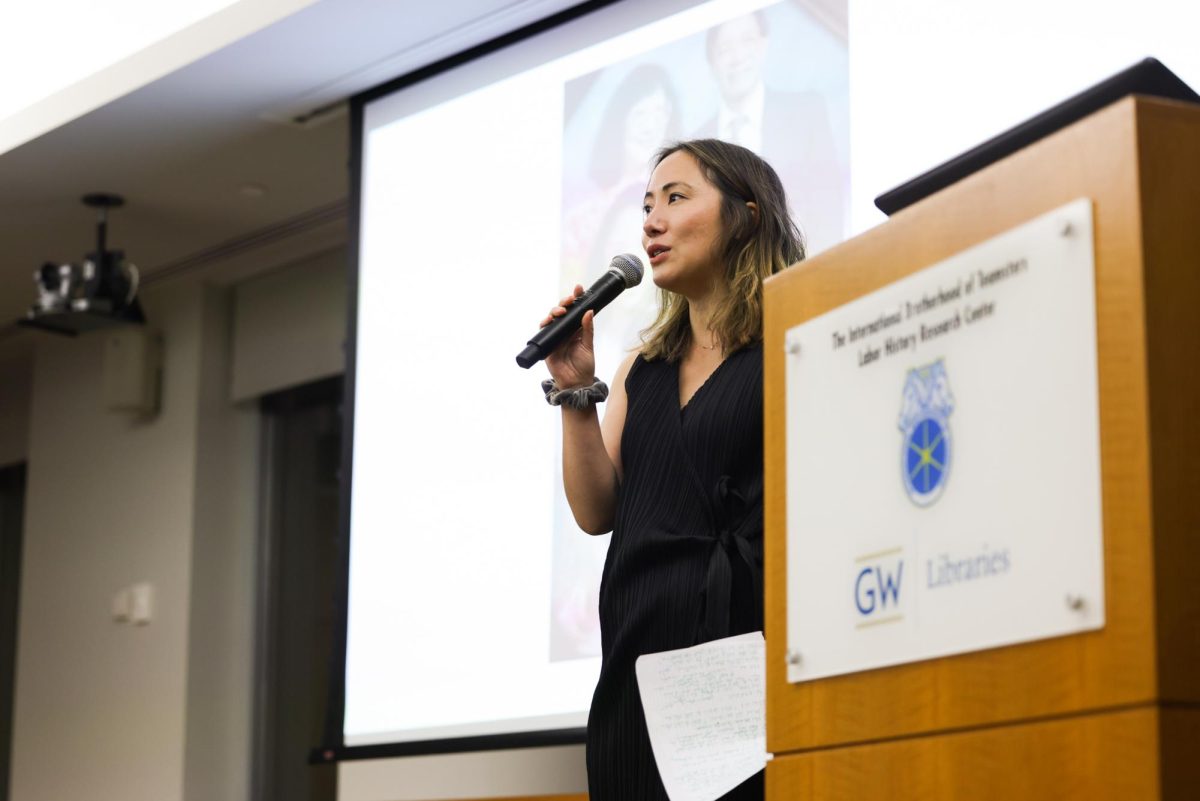Dzhalal Agakishiev isn’t a morning person. His trek to chemistry class, in the torrential downpour before the sun came up Friday morning, was a bit of a slog.
At 7 a.m., he rode 20 minutes down the orange line to West Falls Church, Va. Then Agakishiev waited 25 minutes at a bus stop that hardly provided shelter from the rain, before taking a 45-minute shuttle trip to reach the freshman dean’s seminar, “A Pathway to a Renewable Chemical Economy.”
“We should get half credit just for getting there,” he said.
He’s one of four students taking a rare undergraduate class on the Virginia Science and Technology Campus – 120 acres in Ashburn, Va., mostly used by graduate students and researchers, with an hour-long commute from Foggy Bottom. The campus has been a mainstay for graduate programs in nursing, business, engineering and education, as well as research centers like transportation safety, since it opened in 1991.
The four students tried to make use of the trip by reading over last week’s lab or tilting their heads back for a quick power nap, their earbuds muffling the shuttle’s revving engine along the Virginia highway.
“I think we spend more time traveling than in actual class,” freshman Taylor Smyth said, gulping down coffee on the shuttle ride out to Loudoun County.
But the freshmen, all leaning toward becoming political science majors, have a bright outlook on what many would call a highly inconvenient class.
The students were unaware that the class would include a biweekly Friday lab on the Virginia campus when they registered, but they said it hasn’t dampened their experience – or prevented them from going out on Thursday nights.
“They sold [the class] to us and then they were like, ‘Okay, so here’s the deal, we can do the labs here, but they won’t be as cool, or we could do them in Virginia.’ They didn’t tell us how far the campus would be,” Mathew Michanie said.
Michanie raved about the hands-on lab in the green-focused class that uses solar panels and ultraviolet lights to teach students about the chemical components of climate change and sustainability. His morning commute begins even earlier than that of the other students – he first takes a shuttle from the Mount Vernon Campus to Foggy Bottom before hopping on the Metro.
“I’ve always been interested in environmental studies, and this [class] is an extension on that to a whole other degree, and it takes a perspective that I have never seen before in my life,” Michanie said. “It is really chemistry-heavy, but they put it into terms that you understand.”
Chemistry professor Stuart Licht said the class is one of the only courses offered on sustainable economy at any university across the country – making use of technology not available on most campuses, like solar panels.
Licht said he hopes the University will add more shuttles to the campus so students can have a smoother commute when the course is offered again next fall. He hopes 20 students will sign up.
Their lab was performed in Exploration Hall, one of the four buildings that dot the campus.
The travel time and the course’s 8:30 a.m. start time have prompted some improvisation by Licht and his two teaching assistants, who pointed out that because the class is so small, they don’t mind waiting around for anyone who runs late after missing a component of the commute.
Jessica Stuart, a teaching assistant, recalled one time when a student missed the shuttle and rushed into a cab to get to class. The department later reimbursed him.
Rain prevented students from working with the campus’ solar panels on Friday. Instead, the class donned special sunglasses to protect them against the intense ultraviolet lights that can mimic the sun’s energy potential – a bright wake-up call before their naps during the shuttle ride back to Foggy Bottom.





